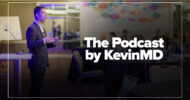Subscribe to The Podcast by KevinMD. Watch on YouTube. Catch up on old episodes!
Scott Bane, senior program officer, discusses his KevinMD article, “How a family caregiver saved my life during a rare medical crisis.” He explores the challenges and triumphs of family caregiving, and the impact of federal policies like the RAISE Act and shares actionable strategies for supporting caregivers in the U.S. Scott provides insights into navigating the health care system and advocates for better resources and support for millions of family caregivers.
Our presenting sponsor is DAX Copilot by Microsoft.
Do you spend more time on administrative tasks like clinical documentation than you do with patients? You’re not alone. Clinicians report spending up to two hours on administrative tasks for each hour of patient care. Microsoft is committed to helping clinicians restore the balance with DAX Copilot, an AI-powered, voice-enabled solution that automates clinical documentation and workflows.
70 percent of physicians who use DAX Copilot say it improves their work-life balance while reducing feelings of burnout and fatigue. Patients love it too! 93 percent of patients say their physician is more personable and conversational, and 75 percent of physicians say it improves patient experiences.
Help restore your work-life balance with DAX Copilot, your AI assistant for automated clinical documentation and workflows.
VISIT SPONSOR → https://aka.ms/kevinmd
SUBSCRIBE TO THE PODCAST → https://www.kevinmd.com/podcast
RECOMMENDED BY KEVINMD → https://www.kevinmd.com/recommended
GET CME FOR THIS EPISODE → https://www.kevinmd.com/cme
I’m partnering with Learner+ to offer clinicians access to an AI-powered reflective portfolio that rewards CME/CE credits from meaningful reflections. Find out more: https://www.kevinmd.com/learnerplus
Transcript
Kevin Pho: Hi, and welcome to the show. Subscribe at KevinMD.com/podcast. Today we welcome Scott Bane. He’s a senior program officer, and today’s KevinMD article is “How a family caregiver saved my life during a rare medical crisis.” Scott, welcome to the show.
Scott Bane: Thank you so much. So glad to be here. All right.
Kevin Pho: So before talking about the article, let’s start by asking, what made you write it and submit it to KevinMD in the first place?
Scott Bane: Well, I had taken a health policy writing class and was working on a piece, and one of the things that the professors urged us to do was to use your own experience to discuss a larger policy issue.
In my professional life, I work on the RAISE National Strategy to Support Family Caregivers. And as my piece that appeared on KevinMD says, I have direct experience and benefited from a family caregiver who saved my life during a medical emergency or crisis. And KevinMD—we came to you, or I came to you, because the professors said that it was a high-traffic site, that you get lots of doctors and clinicians, as well as people’s personal stories. So I thought it was a good fit.
Kevin Pho: All right, well, thank you so much for sharing this story. So for those of you who didn’t get a chance to read your article yet, tell us what it’s about.
Scott Bane: It’s about that in the spring of 2005, I started having difficulty walking out of the blue and went to the emergency room at St. Vincent’s Hospital in New York City, which is where I live and work. They did tests, gave me some steroids, and things seemed to get a little bit better. Very soon after that, I graduated to using a cane, and then my short-term memory started failing. I was still working, but relying on a sea of Post-it notes to try and keep abreast of everything.
Eventually, I left work on disability and was at home one day and had a seizure that started a 60-day hospitalization, which ultimately resulted in a diagnosis of paraneoplastic encephalopathy from Hodgkin’s disease—basically, for the nonclinical people listening to our conversation, an autoimmune reaction to cancer.
Kevin Pho: So, tell us the impact of those caregivers in your life.
Scott Bane: Well, my main caregiver at that time was my partner, to whom I’m now married. So the story has a happy ending in that sense. My partner really looked after me while I was in the hospital. I was severely incapacitated. I’ve often said that the combination of not being able to walk and not being able to remember that I couldn’t walk was particularly onerous.
I would try to get out of bed. There was once I tried to do that, and I fell as well. So David basically advocated for me—this patient needs one-on-one supervision. It was fine when my main neurologist was around because he knew the history, but in the day-to-day flow of the hospital, that wouldn’t always happen, and he would have to advocate for that strongly.
As I say in the piece, ensuring that many things were happening at the same time in the hospital, and so ensuring that the left hand and the right hand knew what each other was doing, and really advocating for me when I couldn’t do that myself.
Kevin Pho: Could you imagine what your hospital course would be like if you did not have someone there advocating on your behalf?
Scott Bane: No. I don’t think I want to go there. And I do hasten to add that’s no criticism of the hospital or the provider. I had great care. It was an incredibly difficult situation. So many caring people at all levels—doctors, nurses, social workers, physical therapists, direct care workers at so many different levels—but, as you know, bodies are sensitive organisms, and lots of things can go wrong. The amazing thing is that the doctors were able to make a diagnosis at all. So how would things have gone without a caregiver? I don’t think I want to go there, if that’s OK.
Kevin Pho: What are some of the challenges that you see in our health care system that almost requires a patient advocate, someone to advocate on behalf of a patient who couldn’t do it themselves? Talk about a broader commentary about what that says about our health care system.
Scott Bane: Well, I think one of the keys that David brought to this is that he was able to be with me all the time. And again, for very understandable reasons, there are lots of discrete pieces within the health care system—different tests, different doctors. What David was able to do was to pull all those together.
I think in the best of all possible worlds, that’s what a patient advocate can do: be able to pull all the pieces together at any given time. It’s a very hard job because, as you know, many things are technical and complex. But being able to understand, basically, what is a cerebral angiogram, what is it doing, and being able to have a layperson’s understanding of that, and to know that, oh, you need to use a special dye—is that going to interfere with the biopsy we have scheduled in four hours, that we’ve been waiting for for a week? All those types of things.
Kevin Pho: So, it’s clear that having a caregiver, in your case, was absolutely necessary to your recovery. Talk to us more about the challenges caregivers themselves face today.
Scott Bane: That’s a great—well, having time. As I say in the piece, both David and I had supportive jobs. For a caregiver, simply having time to be able to spend with a family member is key to serve as that glue. So that’s a key point.
One of the things I allude to in my piece is that Medicare is now reimbursing providers to help train caregivers. That should be helpful as well. But I think, too, that there would be some basic things. For example, David, in his professional life, was a reporter at that time. He was still employed, was still working, and now he’s retired. He always had a small notebook and a pen with him to record what was happening at any given time—be it a direct care worker’s name, just to be able to address somebody by name—to the more complex things like the mediastinoscopy, which was that biopsy to the chest cavity for the nonclinical people listening to our conversation—to be able to keep track of those things and record them and have an understanding of it.
Kevin Pho: So, you mentioned some initiatives to better support caregivers. Talk more about those in detail.
Scott Bane: Sure. The main one, which I’ve been involved in in my professional life in philanthropy, is the RAISE National Strategy to Support Family Caregivers. The RAISE Act was signed in 2018 by President Trump during his first administration, and RAISE stands for Recognize, Assist, Include, Support, and Engage family caregivers.
My foundation and the grantees that the foundation supports have been working on RAISE since that time, as well as government—many different people have been working on RAISE. There is a national strategy that has come out, which has a number of different facets: services and supports for caregivers, more research—like who are caregivers and how can we help them—financial security is a big one. That’s another thing that my piece references: the ultimate price tag of my care was staggering.
And one of the goals of the RAISE National Strategy is to include family caregivers in care teams in a more proactive way.
Kevin Pho: And going forward, what do you see as the next steps in terms of better supporting caregivers?
Scott Bane: Medicare reimbursing providers to train family caregivers—more of that needs to continue to happen. Again, as I allude to in my piece, President Trump on the campaign trail had referenced tax breaks to family caregivers. Those types of things need to continue to happen.
Kevin Pho: So, one of the things that you mentioned was clinicians better training caregivers in the office or in a medical setting. I’m an internal medicine physician myself. What are some of the things that I need to do, some tips, to better help and guide caregivers? What kinds of things should I be training them in?
Scott Bane: I think ensuring that caregivers have an understanding about what’s happening and also why it’s happening, in layperson’s terms. My journey has continued. I’ve had a lot of contact with the medical system, and it always amuses me when my doctors talk to me and then, when they turn to each other, they speak in clinical terms, and it’s as though it’s a completely different language. Ensuring that patients and families have a basic understanding about what’s happening and why.
Kevin Pho: We’re talking to Scott Bane. He’s a senior program officer. Today’s KevinMD article is “How a family caregiver saved my life during a rare medical crisis.” Scott, let’s end with some take-home messages that you want to leave with the KevinMD audience.
Scott Bane: Engage family caregivers. They are a critical piece of care for patients. One of the nicest things a doctor said to David at the end, when I really began to emerge from the depth of my illness, was that it was a pleasure collaborating with him. There is no higher compliment.
Kevin Pho: Scott, thank you so much for sharing your story, time, and insight, and thanks again for coming on the show.
Scott Bane: Thank you.

























